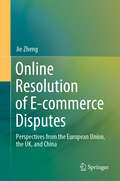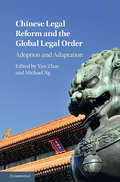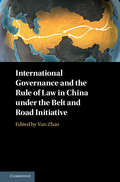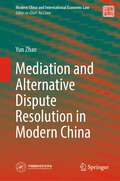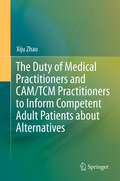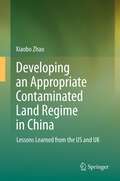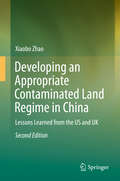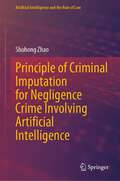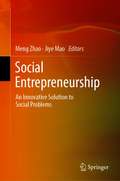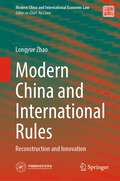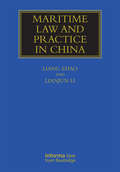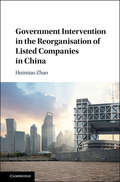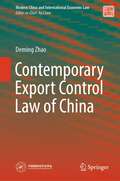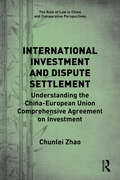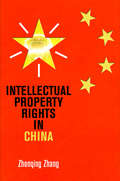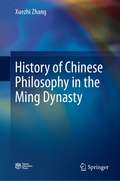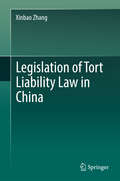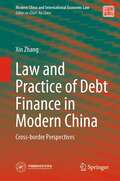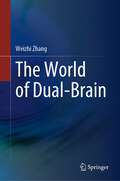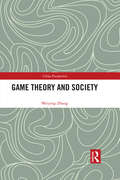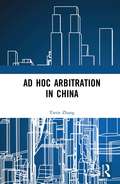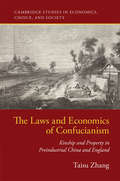- Table View
- List View
Online Resolution of E-commerce Disputes: Perspectives from the European Union, the UK, and China
by Jie ZhengThis book discusses how technological innovations have affected the resolution of disputes arising from electronic commerce in the European Union, UK and China. Online dispute resolution (ODR) is a form of alternative dispute resolution in which information technology is used to establish a process that is more effective and conducive to resolving the specific types of dispute for which it was created. This book focuses on out-of-court ODR and the resolution of disputes in the field of electronic commerce. It explores the potential of ODR in this specific e-commerce context and investigates whether the current use of ODR is in line with the principles of access to justice and procedural fairness. Moreover, it examines the major concerns surrounding the development of ODR, e.g. the extent to which electronic ADR agreements are recognized by national courts in cross-border e-commerce transactions, how procedural justice is ensured in ODR proceedings, and whether ODR outcomes can be effectively enforced. To this end, the book assesses the current and potential role of ODR in resolving e-commerce disputes, identifies the legal framework for and legal barriers to the development of ODR, and makes recommendations as to the direction in which practice and the current legal framework should evolve. In closing, the book draws on the latest legislation in the field of e-commerce law and dispute resolution in order to make recommendations for future ODR design, such as the EU Platform-to-Business Regulation on Promoting Fairness and Transparency for Business Users of Online Intermediation Services (2019) and the United Nations Convention on International Settlement Agreements Resulting from Mediation (2018), which provide the legal basis for ODR’s future development.
Chinese Legal Reform and the Global Legal Order: Adoption and Adaptation
by Yun Zhao Michael NgThis volume critically evaluates the latest legal reform of China, covering major areas such as trade and securities law, online privacy law, criminal law, human rights and international law. It represents a bold departure from the most recent works on Chinese legal reform by engaging the ideas of experts in contemporary Chinese law with the archival scholarship of Chinese legal historians. This unique interdisciplinary feature affords readers a more nuanced view of the complexities and specificities of how China has problematised legal reforms in various historical contexts when building a progressive yet sustainable legal system. This volume appraises the most current reform in Chinese law by considering China's engagement with globalisation, increasingly complicated domestic situation and historical legal transplantation experiences. It will be of huge interest to students, researchers and practitioners interested in Chinese law and policy, China and Asian studies and Chinese legal history.
International Governance and the Rule of Law in China under the Belt and Road Initiative
by Yun ZhaoThe edited volume aims at examining China's role in the field of international governance and the rule of law under the Belt and Road Initiative from a holistic manner. It seeks alternative analytical frameworks that not only take into account legal ideologies and legal ideals, but also local demand, socio-political circumstances, to explain and understand China's legal interactions with countries along the Road, so that more useful insights can be produced in predicting and analysing China's as well as other emerging Asian countries' legal future. Authors from Germany, Korea, Singapore, Mainland China, Taiwan and Hong Kong have contributed to this edited volume, which produces academic dialogues and conducts intellectual exchanges in specific sub-themes.
Mediation and Alternative Dispute Resolution in Modern China (Modern China and International Economic Law)
by Yun ZhaoThe book examines the development and application of mediation in China (including Hong Kong). As a popular mechanism for dispute resolution in Chinese history, mediation is believed to be an important process for realizing the official goal of social harmony. Following an overview of the current situation in mainland China and Hong Kong, the book looks into specific legal issues in the application of mediation and the practical use of mediation in specific lines of businesses. The book can serve as an important reference book on the law and practice of mediation in mainland China and Hong Kong for scholars, practitioners, as well as students of mediation and alternative dispute resolution.
Chinese Environmental Law
by Yuhong ZhaoSince the economic take-off of the 1980s, China has undertaken industrialization and urbanization at unprecedented scale and speed. As it became the world's second largest economy, the burden of pollution has reached the limits of nature's carrying capacity. Chinese Environmental Law provides a comprehensive, structured and up-to-date analysis of the increasingly sophisticated Chinese environmental law regime. It examines the statutory regulation of pollution in detail, covering key environmental statutes, policies and plans, and investigates judicial innovation in the interpretation and application of environmental legal instruments. The book presents Chinese environmental law in action and in context. By discussing key institutions and processes, readers gain exposure to the operation of Chinese environmental law and the dynamic interactions among different institutions, both state organs and non-governmental organizations. The unique socio-economic and political context presents special challenges to the implementation and enforcement of environmental law in China.
The Duty of Medical Practitioners and CAM/TCM Practitioners to Inform Competent Adult Patients about Alternatives
by Xiju ZhaoThe book pays interest to a small and almost untouched topic: a health practitioner' s duty to inform about alternatives. It covers both orthodox medicine practitioners and CAM practitioners. The topic is explored in a co mparative way, examining the laws of not only common law jurisdictions, such as the USA, England, Canada, Australia, New Zealand, but also two East Asia jurisdictions ( China and Japan ) . It uses the collective wisdom of several common law jurisdictions, but also differentiates them. It places the issue of "disclosure of alternatives" in a clear and wider context, making a cogent distinction between diagnosis/treatment and information disclosure.
Developing an Appropriate Contaminated Land Regime in China
by Xiaobo ZhaoLike all industrialized countries, China has encountered increasing problems with land contamination in recent years. Abandoned mining and manufacturing sites and obsolete industrial complexes, while also creating new polluting industrial enterprises, represent impending environmental threats. More importantly, a number of social and economic problems have developed and must be dealt with, in some cases urgently. Contaminated land laws and regulations have been established and have evolved in the US and UK and many other jurisdictions over the past few decades. These regimes have substantially influenced the relevant legislation in the context of numerous Asian and European countries and will inevitably benefit similar legislative efforts in China. This book is the first monograph that focuses on how China can learn from the US and UK with respect to contaminated land legislation and comprehensively illustrates how contaminated land law could be created in China. It will be of interest to academics and practitioners in environmental law in China, as well as the US and UK.
Developing an Appropriate Contaminated Land Regime in China: Lessons Learned From The Us And Uk
by Xiaobo ZhaoLike all industrialized countries, China has encountered increasing problems with land contamination in recent years. Abandoned mining and manufacturing sites and obsolete industrial complexes, while also creating new polluting industrial enterprises, represent impending environmental threats. More importantly, a number of social and economic problems have developed and must be dealt with, in some cases urgently. Contaminated land laws and regulations have been established and have evolved in the US and UK and many other jurisdictions over the past few decades. These regimes have substantially influenced the relevant legislation in the context of numerous Asian and European countries and will inevitably benefit similar legislative efforts in China. This book is the first monograph that focuses on how China can learn from the US and UK with respect to contaminated land legislation and comprehensively illustrates how contaminated land law could be created in China. It will be of interest to academics and practitioners in environmental law in China, as well as the US and UK.
The Perpetrator-Victim Relationship: An Important Clue to Understanding Intimate Partner Homicide in China
by Shuhong ZhaoThis book is devoted to illustrating the significance of perpetrator-victim relationship, including its status and state, in understanding intimate partner homicide (IPH) in the context of China today after comparing with the findings in the previous studies. By analyzing the correlation between intimate relationships as a focal variable and other variables such as IPH characteristics and risk factors, a deeper understanding of IPH in China today has emerged. Finally, this book shows that many perpetrators and victims had intimate relationships with people outside their marriages as the main reason for the rapid increase in the number of instances of IPH, which seems to be in tandem with China’s rapid modernization and urbanization. Presenting the sole academic research that closely investigates the characteristics of intimate partner homicide in modern China, the book is a valuable resource for not only for the Chinese government but also for Chinese and international researchers.
Principle of Criminal Imputation for Negligence Crime Involving Artificial Intelligence (Artificial Intelligence and the Rule of Law)
by Shuhong ZhaoThis book provides an in-depth discussion of the theoretical and practical issues of criminal imputation for negligence crime involving artificial intelligence. Accordingly, this study combines the imputation challenges brought about by AI with traditional criminal imputation theory and analyses imputation for negligence crime involving AI from three aspects: the basic principles, structure, and results of imputation for negligence crime involving AI. The traditional theory of imputation is discussed in detail. The readership is a group of people interested in this topic, including, in particular, interested laymen, undergraduate students and postgraduate researchers. The highlights of this book are it identifies the imputation challenges bought about by AI, reveals the theoretical and practical gap in the criminal imputation of negligent crimes involving AI, and provides an in-depth and creative ideas of criminal imputation for the negligent crimes involving AI.
Social Entrepreneurship: An Innovative Solution to Social Problems
by Meng Zhao Jiye MaoThis book incorporates theoretical framework and management cases in discussions on social enterprise in China. The authors look to address two fundamental questions about social enterprises in China that have been very controversial over the years. First, what is social enterprise? This book proposes a framework that defines Chinese social enterprises based on social entrepreneurship, and includes ten case studies for justification. Second, who are well-performed social enterprises with financial viability and proved social impact? The book describes in detail some of the leading social enterprises in China. It is aimed at a wide target audience. Practitioners will learn experience and lessons from the case studies. Academics can use the cases in different teaching contexts, and gain research inspirations from our framework and case studies. Policy makers, accreditation agencies, professional service providers, and institutional investors will learn to identify and evaluate promising social enterprises.
Modern China and International Rules: Reconstruction and Innovation (Modern China and International Economic Law)
by Longyue ZhaoThis book is the final study report of the key project of the National Social Science Foundation of China, “China and the Reconstruction and Innovation of International Rules in the New Era of Global Value Chain”. On the basis of a comprehensive analysis of the complex situation of international rule reconstruction and innovation in the new era of the global value chain, this book makes an in-depth and systematic analysis on six types of international rules, namely official export credit rules, international competition rules, cross-border e-commerce and digital trade rules, ISDS, multilateral agreement on investment and international regulatory cooperation. It also introduces the theories and practices of China's engagement in the new round of reconstruction and innovation of international rules.
Maritime Law and Practice in China (Maritime and Transport Law Library)
by Liang Zhao Li LianjunA comprehensive treatment of Chinese maritime law and judicial practice, this book covers both substantive law and procedure law of maritime law in mainland China. This is a professional book for both academics and practitioners in the field of maritime law. Including analysis of and comment on judicial practice from the Supreme People’s Court, Higher People’s Courts and ten maritime courts, as well as a whitepaper of Chinese maritime adjudication for 30 years (1984-2014), this brings to an English-speaking audience for the first time some of the most technical aspects of maritime law. It is therefore an invaluable resource for all those interested in maritime law in China.
Government Intervention in the Reorganisation of Listed Companies in China
by Huimiao ZhaoAs a comprehensive empirical study on the bankruptcy re-organisations of listed companies in China, this book examines the re-organisation of fifty-three listed companies entering bankruptcy between 2007 and 2018. It features raw data from thousands of public announcements of listed companies, helping to present a precise panorama of bankruptcy law in China. The author discusses the nature, extent and appropriateness of government intervention in bankruptcies of listed companies. It also examines the effects of bankruptcy institutions established by the bankruptcy laws to constrain government intervention. The findings suggest that such laws have been inadequate to prevent government intervention. In fact, the biggest obstacle to the smooth implementation of China's reorganisation system is government intervention, one distinct characteristic of the socialist market economy. The book will have broader relevance in terms of informing the debate concerning the government's continuing intervention in economic activity in China.
Contemporary Export Control Law of China (Modern China and International Economic Law)
by Deming ZhaoThis book gives practical and in-depth presentation and analysis of the issues under China export control law and economic sanctions regime. This book not only addresses issues faced by the legal entities in China, but also attends to the concerns about Chinese extra-territorial jurisdiction of China export control law and sanctions legislations, on the part of foreign companies. Finally, the author shares his experiences on how to structure export control and sanctions compliance under Chinese law on the part of both Chinese and foreign companies.
International Investment and Dispute Settlement: Understanding the China–European Union Comprehensive Agreement on Investment (The Rule of Law in China and Comparative Perspectives)
by Chunlei ZhaoThis book analyzes the dispute settlement mechanisms under the EU-China Comprehensive Agreement on Investment (CAI), including the already established mechanisms for general state-to-state dispute settlement and the Mechanism to Address Differences for investment and sustainable development issues. When China and the EU, two of the biggest players in international investment, announced the completion of the China-European Union CAI negotiations, the dispute settlement system remained incomplete. While they reached an agreement on state-to-state dispute settlement, the controversial investor-state dispute settlement is subject to ongoing negotiations. This book explores the possible procedural design of investor-state dispute settlement mechanisms under the EU-China CAI, including potential proposals, issues, and solutions. In addition, this work analyzes the separation, connection, and combination of state-to-state and investor-state dispute settlement, all with a mind to ensuring the function and operation of diverse mechanisms and establishing a comprehensive system for successful investment dispute settlement. Focusing on the complete dispute settlement system under the EU-China CAI, this book will be a valuable resource for students, academics, and policymakers working in the areas of international dispute resolution, international investment law, international economic law, and comparative law.
Corporate Reorganisations in China: An Empirical Analysis
by Zinian ZhangThe first comprehensive empirical study on corporate bankruptcy reorganizations in the second largest economy, China, investigating the formal corporate restructurings handled by China's courts between 2007 and 2015. The data and analysis presented in the book provide a unique lens from which China's newly-enacted Chapter 11-styled corporate reorganization law, both in the books and in practice, can be understood and from which the interaction between business and state in dealing with corporate bankruptcies in China could be better comprehended. This book benefits from the author's ten-year business law practice in China, and his insights on China's judicial and political system considerably enrich the arguments. In particular, this book sheds light on commencement of bankruptcy reorganizations, control models, corporate reorganization financing, value distribution, approval of reorganization plans and cross-border reorganizations under the China Enterprise Bankruptcy Law of 2006.
Intellectual Property Rights in China
by Zhenqing ZhangOver the past three decades, China has transformed itself from a stagnant, inward, centrally planned economy into an animated, outward-looking, decentralized market economy. Its rapid growth and trade surpluses have caused uneasiness in Western governments, which perceive this growth to be a result of China's rejection of international protocols that protect intellectual property and its widespread theft and replication of Western technology and products. China's major trading partners, particularly the United States, persistently criticize China for delivering, at best, half-hearted enforcement of intellectual property rights (IPR) norms. Despite these criticisms, Zhenqing Zhang argues that China does respect international intellectual property rights, but only in certain cases. In Intellectual Property Rights in China, Zhang addresses the variation in the effectiveness of China's IPR policy and explains the mechanisms for the uneven compliance with global IPR norms.Covering the areas of patent, copyright, and trademark, Zhang chronicles how Chinese IPR policy has evolved within the legacy of a planned economy and an immature market mechanism. In this environment, compliance with IPR norms is the result of balancing two factors: the need for short-term economic gains that depend on violating others' IPR and the aspirations for long-term sustained growth that requires respecting others' IPR. In case studies grounded in theoretical analysis as well as interviews and fieldwork, Zhang demonstrates how advocates for IPR, typically cutting-edge Chinese companies and foreign IPR holders, can be strong enough to persuade government officials to comply with IPR norms to achieve the country's long-term economic development goals. Conversely, he reveals the ways in which local governments protect IPR infringers because of their own political interests in raising tax revenues and creating jobs.
History of Chinese Philosophy in the Ming Dynasty
by Xuezhi ZhangThis book starts with the classification of the main views of different thinkers after the study of the original materials, which covers all the thinkers’ thoughts and conceptions. A major objective of this book is to reveal the ideas of the philosophers. Key ideological opinions are stated with the former discussion of exact questions and further clarification of their philosophical meaning, which enables the readers to better understand the meaning and value of the philosophical thoughts. Since the logic and history are in accordance with each other, a frame of conception is formed then. Then, the author clearly explains the logical relationship in the frame mentioned before, as well as the formation of the key concepts and their relationship.
Legislation of Tort Liability Law in China
by Xinbao ZhangThis book studies the fundamental conflicts between the protections on the legal rights and interests of victims and the freedom of infringers to act first. It is divided into four parts, the first of which explores the relevant legal methodology in order to provide possible solutions to difficult problems in Chinese tort liability law. Secondly, it puts forward a range of suggestions on how to resolve key issues in China's torts liability law, including the general provisions; the provisions concerning the fault principle; the provisions of the non-fault principle; the special liability relation; damages; and defenses and related issues. Thirdly, the book addresses major institutional issues, including: the theory of consensus force; joint infringements; and operators' duty of care; as well as several key relations: between the right to claim insurance compensation and the right to claim compensation for personal injury; between the right to claim tort liability and the right to exercise property rights; and between the right to claim tort liability and the right to reject unjust enrichment. Further aspects in this section include compensation for death; mental damages; pure economic loss and compensation; punitive compensation; and compensation for road traffic accidents. Lastly, the book explores special issues in tort liability law, e. g. the infringement of media rights, and the specific tort liability in various administrative laws and regulations.
Law and Practice of Debt Finance in Modern China: Cross-border Perspectives (Modern China and International Economic Law)
by Xin ZhangThis book provides updated, full-picture analysis of the laws and practices of cross-border debt finance in the PRC. It is featured by the first-handed experiences of the author’s academic research and legal practice in this field over two decades. The author discusses legal and regulatory issues, transaction structures and documentation in relation to two debt finance products: loan and bond, covering the inbound structure (Chinese debtors’ raising funds from the international market) and the outbound structure (Chinese creditors’ supplying funds to the international market). For cross-border loans, this book thoroughly illustrates the foreign debt regulatory regime in the PRC and approaches the lending by Chinese banks to support exports and overseas investments under the “Belt and Road Initiative” (BRI). For cross-border bonds, it discusses how Chinese issuers, by designing various transaction structures, enter into the international bond market, and then researches the “opening-up” of Chinese bond market to both international issuers (for issuing “Panda Bonds”) and investors (for purchasing Chinese bonds). This book is used as an authoritative source for not only students and researchers, but also bankers and legal practitioners, who are interested in the Chinese debt finance market.
The World of Dual-Brain
by Weizhi ZhangThis book leaves the template of the inertia of natural human society and traditional ideological thinking, to illustrate the mechanism of the generation of the Sociality Brain and to explore the construction path of the human-computer symbiosis order. At the same time, this book proposes concepts including ‘wisdom sharing system’, ‘the Sociality Brain’, ‘dual-brain world’, ‘off-site economic civilization’, ‘basic contradictions in the intelligent world’, and ‘class analysis and division of the dual-brain world’, etc. This is a philosophical thinking about the intelligent world beyond the categories of natural human society and biological brain.
Game Theory and Society (China Perspectives)
by Weiying ZhangThe progress of society can only happen through interpersonal cooperation, because only cooperation can bring about mutual benefit, thus bringing happiness to each person. This should be our collective rationality, but we often see it conflicts with individual interests, which leads to the so-called "Prisoners’ Dilemma" and does not bring happiness to all. From a game theoretical perspective, this book addresses the issue of how people can cooperate better. It has two objectives. The first is to use common language to systematically introduce the basic methodologies and core conclusions of Game Theory, including the Nash equilibrium, multiple equilibriums, dynamic games, etc. Mathematics and theoretical models are used to the minimum necessary scope too, to make this book get access to ordinary readers with elementary mathematical training. The second objective is to utilize these methods and conclusions to analyze various Chinese social issues and institutional arrangements, with a focus on the reasons people exhibit non-cooperative behaviors as well as the institutions and cultures that promote interpersonal cooperation. In addition to economics, specialists in sociology, law, history, politics and management will also be attracted by this book for its insightful analysis on the issue of cooperation in these fields. Also, readers curious about Chinese society will benefit from this book.
Ad Hoc Arbitration in China
by Tietie ZhangArbitration is the dominant method in the world for resolving international commercial disputes. As compared with institutional arbitration, ad hoc arbitration has many advantages that make it a preferred way to resolve commercial disputes on many occasions. The Arbitration Law of the People’s Republic of China, however, requires that parties appoint an arbitration institution in their arbitration agreement; otherwise an ad hoc arbitration agreement is invalid. This rule seems to preclude ad hoc arbitration under Chinese law and threatens the validity of many arbitration agreements that are imperfectly drafted. Fortunately, however, this does not mean Chinese courts will never enforce an ad hoc arbitration agreement or an ad hoc arbitration award. This book informs parties and practitioners of potential pitfalls related to ad hoc arbitration in China and offers practical guidance. It also conducts a comparative study of the history of arbitration in the Western world and in China, to identify the reasons for this hostility to ad hoc arbitration and calls for changes to this requirement under Chinese law.
Cambridge Studies in Economics, Choice, and Society: Kinship and Property in Preindustrial China and England (Cambridge Studies in Economics, Choice, and Society)
by Taisu ZhangTying together cultural history, legal history, and institutional economics, The Laws and Economics of Confucianism: Kinship and Property in Pre-Industrial China and England offers a novel argument as to why Chinese and English pre-industrial economic development went down different paths. The dominance of Neo-Confucian social hierarchies in Late Imperial and Republican China, under which advanced age and generational seniority were the primary determinants of sociopolitical status, allowed many poor but senior individuals to possess status and political authority highly disproportionate to their wealth. In comparison, landed wealth was a fairly strict prerequisite for high status and authority in the far more 'individualist' society of early modern England, essentially excluding low-income individuals from secular positions of prestige and leadership. Zhang argues that this social difference had major consequences for property institutions and agricultural production.
